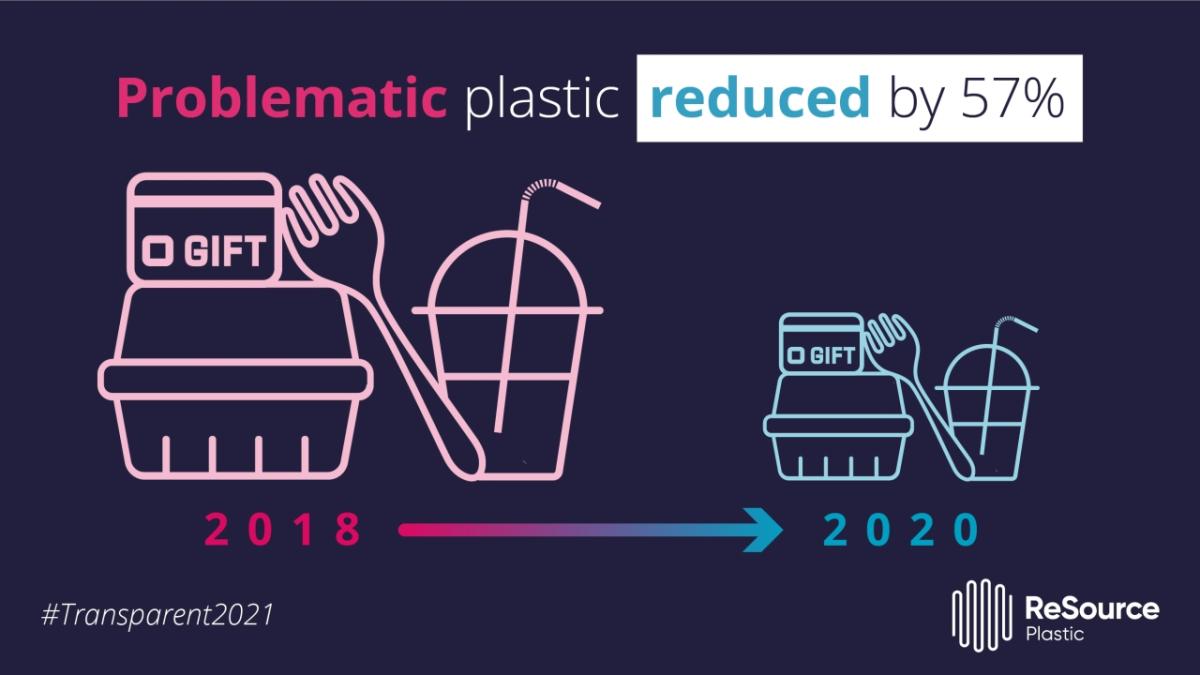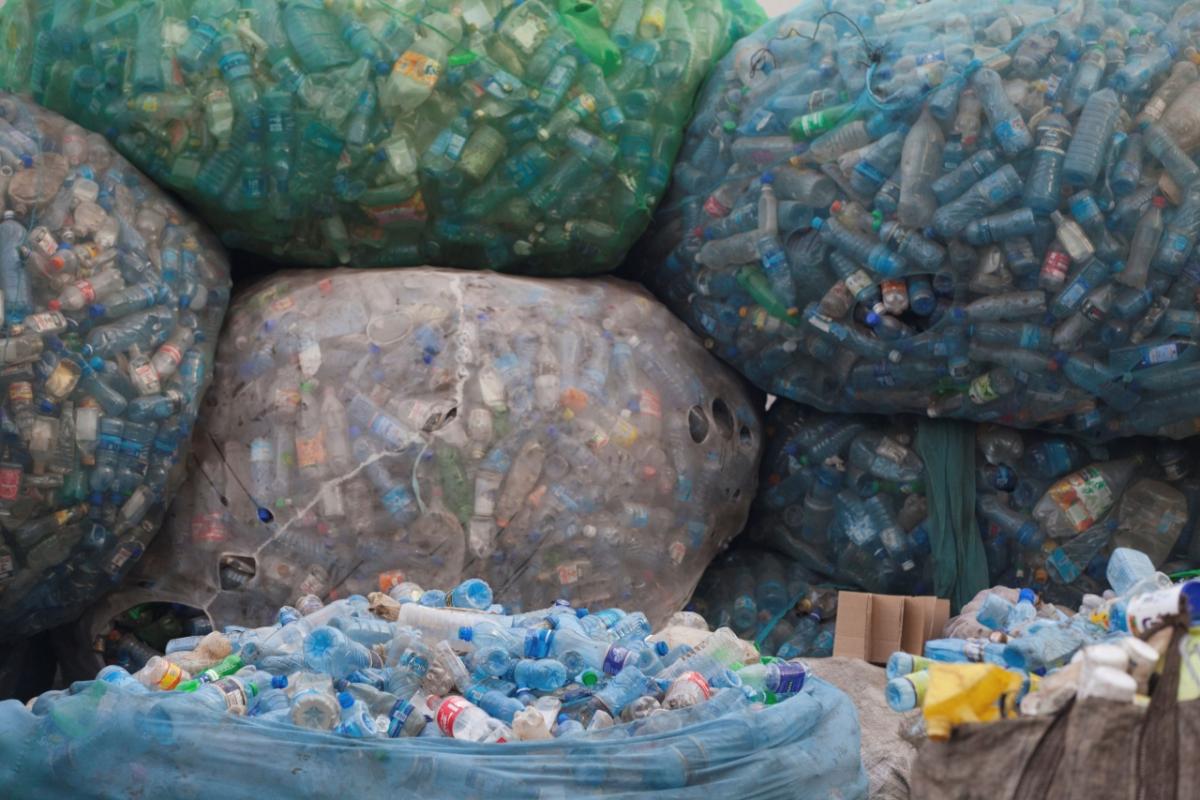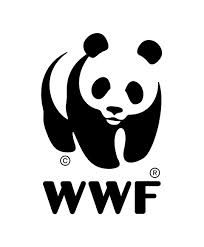ReSource Plastic Member Companies Eliminated More Than Half of Their Problematic Plastic From 2018-2020; Waste Infrastructure Posed Challenges to Increasing Recycled Content
WWF’s Transparent 2021 report details where major companies are making progress toward addressing the plastic waste crisis
WASHINGTON, December 8, 2021 /3BL Media/ - A new report from World Wildlife Fund (WWF) finds that Principal Members in the organization’s ReSource: Plastic program – Keurig Dr Pepper, McDonald's Corporation, Procter & Gamble, Starbucks, and The Coca-Cola Company – cut their use of problematic plastic[1] by 57% between 2018 and 2020. This significant reduction, which totaled 71,000 metric tons, included the elimination or material transformation of hard-to-recycle small items like straws, utensils, and materials like rigid foam and vinyl.
The decrease in problematic plastic is one of many metrics highlighting progress published in Transparent 2021, the second annual report from ReSource: Plastic. Launched in 2019, the program is a first-of-its-kind effort to quantify corporate impact and track company actions and opportunities to prevent millions of tons of plastic waste. The Transparent reporting series looks at how plastic footprints are changing year-over-year, tracking progress and prioritizing recommendations for action in three areas WWF finds critical for corporate engagement on plastic: eliminating unnecessary plastic, making the plastic they do need from sustainable inputs, and doubling their recycling rates. In addition to looking at where and how Principal Member companies have improved since 2018, Transparent 2021 also includes baseline data on plastic footprints for ReSource Members that joined in 2020: Amcor, Colgate-Palmolive, and Kimberly-Clark.
“Businesses have been talking about the plastic pollution problem for some time, which is an important step, but it’s now time to ask the tough questions: what have you done and is it really making a difference?” said Sheila Bonini, senior vice president of private sector engagement, WWF. “In this reporting series, ReSource Members are answering, by putting all their data – the good, the bad, and the ugly – on the table so we can see what actions are or are not working, and it is clear how they can maximize their ability to make impact.”
Following the baseline plastic footprint analysis of these companies, which was published in 2020, this latest Transparent report finds promising progress in some areas, particularly around eliminating unnecessary plastic. Another notable development is in the advancement of reusability – an intervention that has the potential to curb the demand for single-use items. Several companies introduced or expanded reuse pilots, and/or participated in Consumers Beyond Waste to develop critical guidance for environmentally and socially responsible reuse systems.
Less encouraging was the progress toward incorporating recycled content into plastic that can’t be eliminated, which underscores the continued investment necessary to build the recycled content supply chain – even when the demand is high – given systemic issues in waste management and recycling infrastructure. The use of recycled content among ReSource Members increased from 7.8% to 9.6% (+124,000 metric tons) between 2018 and 2020, a modest improvement which requires acceleration to meet their time-bound goals.
Addressing these issues presents the greatest opportunity for ReSource Members to make an impact at scale. The report points to promising developments over the past year: a new Polypropylene Recycling Coalition, of which some ReSource Members are members or co-founders, has already awarded 13 grants that will increase recycling access for polypropylene in the U.S. by 6%; and a $12.5M commitment from American Beverage Association, a ReSource implementing partner, to modernize PET recycling. This commitment is projected to make an additional 693M pounds of PET recycled content available over the next 10 years.
Primary recommendations for the year ahead include the continued elimination of unnecessary plastic through reduction, substitution, and business model innovations like reuse systems. To build on the momentum on reuse, Transparent 2021 encourages all eight ReSource Member companies to move from pilots to market scale. The report emphasizes that with further ambitious collective action, reuse systems have the potential to fundamentally change how we use and dispose of plastic.
The report also calls on companies to support collective action and investment in recycling systems, as well as policy interventions with multi-stakeholder representation like extended producer responsibility (EPR). Many ReSource Member companies are already involved in such efforts, which will be critical to unlocking access to recycled content inputs. Finally, the report cites the continued need for improved and standardized data and recommends a global treaty on plastic pollution – which a number of ReSource member companies have already endorsed – as a fundamental building block for standardized measurement to inform policymakers, corporate decision makers, and the public.
Bonini added: “Thanks to the unprecedented transparency from ReSource: Plastic Members, for the first time we can now confidently say, this is where you’ve made real-world, quantifiable progress, and this is where you need to focus and invest going forward.”
[1] Problematic plastic includes single-use plastic items which are either unnecessary or have inherent issues in their material or design which prevent them from being recycled or composted or pose a specific environmental risk. In Transparent 2021, the following categories were included in our calculation of problematic plastic: polystyrene (PS), expanded polystyrene (EPS), or polyvinyl chloride (PVC) and small plastics.
#
About World Wildlife Fund (WWF)
WWF is one of the world’s leading conservation organizations, working for 60 years in nearly 100 countries to help people and nature thrive. With the support of 1.3 million members in the United States and more than 5 million members worldwide, WWF is dedicated to delivering science-based solutions to preserve the diversity and abundance of life on Earth, halt the degradation of the environment, and combat the climate crisis. Visit worldwildlife.org to learn more; follow @WWFNews on Twitter to keep up with the latest conservation news; and sign up for our newsletter and news alerts here.
ReSource: Plastic Member Quotes
Amcor
“At Amcor, we’re making solid progress against our pledge to ensure that all our products will be recyclable or reusable by 2025. Today approximately 74% of our packaging portfolio is designed to be recycled, and we’re making great progress introducing new recyclable options to achieve our goal. We know that to improve recycling rates, we need better waste management and recycling infrastructure. So, Amcor is proud to be acting with our partners, including WWF and the Alliance to End Plastic Waste, on a variety of important recycling infrastructure projects to ensure that packaging that is designed to be recyclable is recycled in practice and at scale.”
David Clark, Vice President of Sustainability, Amcor
The Coca-Cola Company
“The progress demonstrated in WWF’s Transparent 2021 report shows the continued need for ambitious, collective action. When we work together, we can take meaningful steps to advance a circular economy and reduce waste.”
Bea Perez, Senior Vice President and Chief Communications, Sustainability and Strategic Partnerships Officer, The Coca-Cola Company
Colgate-Palmolive
"Colgate-Palmolive's partnership with WWF's ReSource program has been invaluable. It provides necessary tools, information, and collaboration towards Colgate-Palmolive's sustainability ambition to Eliminate Plastic Waste as well as our purpose to reimagine a healthier future for all people, their pets and our planet. WWF's work also provides a consistent reporting platform accessible to Plastics Pacts and other collaborators, bringing needed harmonization to the complicated world of reporting."
Ann Tracy, Chief Sustainability Officer, Colgate-Palmolive
Keurig Dr Pepper
“Packaging waste – particularly plastic waste – is a growing global challenge. At Keurig Dr Pepper our vision is a circular future in which our packaging is recycled and repurposed to remain in use and out of the environment. We have set aggressive goals to increase the recycled content and recyclability of all our packaging, to decrease the amount of virgin plastic we use by 2025, and as a Founding Member and largest funder of The Recycling Partnership’s Polypropylene Recycling Coalition, we are focused on collaborative action to improve the circularity of our products and packaging. The information contained within the Transparent 2021 report helps to validate the course we have set with respect to packaging and will also help chart our course on packaging into the future.”
Monique Oxender, Chief Sustainability Officer, Keurig Dr Pepper
Kimberly-Clark
“As part of our ambition to drive innovative solutions, we are working to address the challenges associated with single-use plastics. By 2025, our goal is that 100% of our packaging will be reusable, recyclable or compostable, and that we’ll achieve 20% average recycled content across our plastic packaging. These goals play a critical role in how we deliver our purpose of Better Care for a Better World, and we are excited to partner with organizations such as ReSource: Plastic as we work together to measure progress, address gaps and shared challenges, and identify opportunities to accelerate meaningful, long-term change.”
Lisa Morden, Vice President of Safety, Sustainability & Occupational Health, Kimberly-Clark
McDonald’s Corporation
“As we navigate the plastic pollution challenge and look to a more sustainable future, WWF’s ReSource: Plastic program continues to be immensely valuable. Through this partnership, we are supporting transparency across the industry that allows us to pinpoint not only the areas of opportunity within the McDonald’s System, such as increasing recycled content in our packaging and reducing small plastics, but also the critical opportunities where brands can act jointly to enable the biggest impact globally. This type of collective action is necessary to move with the speed, urgency and scale that the plastics challenge demands, and we’re grateful to be partnering with WWF and ReSource Principal Members on such important work.”
Jenny McColloch, Chief Sustainability Officer, McDonald’s Corporation
Procter & Gamble
“This year’s Annual ReSource: Plastic Progress Report demonstrates the value of industry collaboration to identify the highest impact improvements our companies can deliver to help keep plastic out of our environment. We thank WWF for this forum as it is helping us focus our efforts in ways that can both progress our corporate goals and drive positive change at scale for industry.”
Jack Mcaneny, Vice President, Global Sustainability, Procter & Gamble
Starbucks
“Last year, Starbucks announced an ambitious goal to reduce carbon, water and waste by 50% by 2030. We’re proud of the progress we’ve made over the past year towards our waste target through strategies like testing reusable cup approaches, eliminating plastic straws and working with local municipalities to improve recycling infrastructure, but we have a long way to go. Meeting our goals requires collaboration with the private sector, NGO’s, governments and participation in programs like ReSource that create a common framework to track progress and offer insights for us to act on to create real sustainable change.”
Michael Kobori, Chief Sustainability Officer, Starbucks
##



